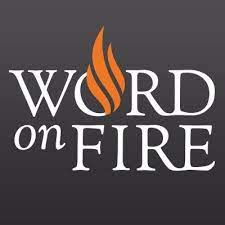HOMILY WEEK 29 04 – Year I
Word on Fire:
(Rm 6:19-23; Ps 1; Lk 12:49-53)
*********************************************
Word on Fire is what Robert Barron, auxiliary bishop of the Archdiocese of Los Angeles, calls his social media ministry.
 That title was probably inspired by the gospel of today, in which Jesus exclaims that he came to bring fire to the earth, and how he wished it were already kindled.
That title was probably inspired by the gospel of today, in which Jesus exclaims that he came to bring fire to the earth, and how he wished it were already kindled.
The readings today encourage us to be on fire with God’s word, to allow it to transform us and to live in Christ, even if that involves some opposition and persecution.
Psalm 1 sets the tone. Our delight is to be in the law of the Lord, on which we are to meditate day and night. It goes on to say those who pray with the Word of God, who ponder and contemplate it, will be like trees planted by streams of water that flourish, prosper and never wither in the face of drought.
That statement brings to mind the stark contrast of the arid desert in the Holy Land to the lush, tall green palm trees in areas that are irrigated. Where there is no water, there is only dry, rocky sand; where there is water, the trees flourish. Rooted in God’s Word, we will flourish.
In the scriptures, St. Paul is clear that the Word of God is alive and active, that it penetrates between the bone and the marrow, reaching deep within us where the best of psychology and therapy cannot go, to heal and to transform.
In the first reading to the Romans, he reminds us that by faith and baptism, we have died to sin, and are now called to live “as slaves to righteousness for sanctification.” That brings to the fore the whole process of theosis or divinization to which faith in Christ calls us. St. Paul mentions “sanctification” a second time, with the teaching that the goal is the experience of eternal life in Christ Jesus our Lord as a free gift.
This is all based on the two-fold mission of Jesus as the Messiah – to redeem and to sanctify; to forgive and to heal. When we come to Jesus in a spirit of repentance to receive his unconditional love as forgiveness, and humbly ask him to also heal our painful emotions, defects of character and addictions, we are being transformed into his image and likeness. That is called theosis, divinization, and leads to that experience of eternal life in Christ Jesus, not just after we die, but today, here and now – what is called realized eschatology, or heaven happening to us already.
That is the fire Jesus came to bring to the earth, and that Bishop Barron is trying to help spread. That fire could refer to the eternal life Jesus longs to share with us, as well as be compared to the fire clearing the way for something new to be built.
The baptism Jesus mentions and longs to undergo (actually, a second baptism), I believe refers to his passion and death awaiting him, that he trusts will lead to resurrection and the gift of new eternal life for us. Jesus goes on to say when we are grounded in our faith in him, and rooted in his word, we will have what it takes to face any persecution or resistance (our own second baptism) that will come from those who do not believe and who resist this call to repentance and change.
The Eucharist is a foretaste of that eternal life and joy, even now, and an experience of forgiveness and healing through Word and sacrament.
So, may our celebration motivate us to be on fire with God’s love, rooted in God’s Word, on a healing journey, sharing in eternal life even now, and ready to suffer for our faith and for Christ.



